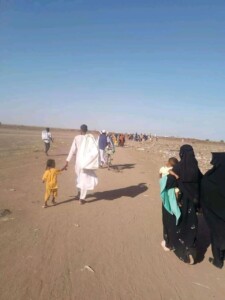Contested Sudan-South Sudan border area sees at least 27 deaths
The Sudan-South Sudan disputed border area of Abyei, witnessed extremely bloody attacks by armed herdsman that resulted in the deaths of at least 27 people and four injured on March 6.
 UNISFA patrol in Abyei (UNISFA)
UNISFA patrol in Abyei (UNISFA)
The Sudan-South Sudan disputed border area of Abyei, witnessed extremely bloody attacks by armed herdsman that resulted in the deaths of at least 27 people and four injured on March 6.
Since then, Abyei’s chief administrator spoke with South Sudan’s President, Salva Kiir, stating that the situation is now under control thanks to the concerted effort between the South Sudanese government and the United Nations Interim Security Force for Abyei (UNISFA).
In a press statement made yesterday by a spokesperson for the UN Secretary-General, António Guterres, the UN stressed their deep concerns regarding the renewed violence in southern Abyei. They also highlighted three armed attacks on UN patrols.*
A joint statement released by the US Embassy in Khartoum and Juba yesterday, expressed their concern in the region’s escalating violence and offered condolences to the families of those killed in Abyei. The statement was in full support of UNISFA’s mandate, authorising peacekeepers to exercise their force by any means necessary, in order to quell violence and protect civilians.
Protection
Abyei, an area at the Sudan-South Sudan border, is the traditional homeland of the Ngok Dinka, who have with strong ties with the South Sudanese Dinka tribe. Herders of the Misseriya, a northern Arab tribe, traverse Abyei and other Sudan-South Sudan border areas with their cattle in search of water and pasture in the dry season and to trade goods. The region witnesses many cases of cattle rustling, hijacks, and other robberies.
Since the secession of South Sudan from Sudan in 2011, both countries claim the oil-rich region of Abyei. In the same year, the UN Security Council decided on the establishment of UNISFA, to monitor and verify the redeployment of armed forces from Abyei.
UNISFA also has a mandate to protect civilians under imminent threat of physical violence, to protect the area from incursions by unauthorized elements, and ensure security.
On May 1 2021, Radio Dabanga reported that the UN Under-Secretary-General for Peace Operations requested that the Security Council consider a six-month rollover of the UNISFA mandate, citing the volatile security situation.
* This article was updated on 11 March 2022. While the original briefing by spokesperson for UN Secretary General António Guterres, Stephane Dujarric suggested that a Doctors Without Borders/Medecins Sans Frontieres (MSF) hospital was targeted, MSF have informed Radio Dabanga that the MSF hospital has not been targeted during the violence. “It has actually been respected and no damage or looting of the hospital has occurred,” the MSF spokesperson says.











 and then
and then